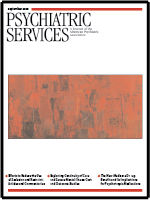To the Editor: I read with interest the commentary by Wesley Sowers, M.D., in the June Taking Issue, in which he describes how the scope of psychiatry has narrowed and calls on psychiatrists to "reclaim" psychiatry by moving in the direction of consumer- and family-driven, recovery-oriented services. From the perspective of many psychiatrists, what happens in an acute care facility is that symptoms are treated with a direct and unambiguous application of logical, rational, scientific, empirical, and objective psychopharmacologic procedures that are well known and that require little more than routine effort to carry out.
However, this perspective cannot possibly lead to a client's recovery. Clients do not get better simply by sitting idly by and waiting for medications to take effect. The predominant processes in an individual's progression toward recovery occur in the arenas of subjectivity and irrationality. The client who perceives that something strictly rational, rather mechanical, and routinely procedural is occurring is not sufficiently involved in the mysterious aspects that need to take place in order for the client to leave the hospital with the hope of adopting a new and healthier approach to life. This person is likely to experience relapse in the near future. To accomplish a change of "people, places, and things," as the 12-step literature describes, an individual needs support in developing skills in several areas—community living, social, recreational, educational, and vocational skills—so that the individual's environment can become different from the one that precipitated the decompensation.
From the professional's point of view, the action of treatment is confined to the brain, while to the client, the actions of significance occur in the mind. Whereas the study of the brain is largely a science, the study of the mind cannot be purely scientific, because free will operates within the realm of the mind. Free will, quite clearly, cannot be reduced to a strictly rational or mechanical process that is subject to scientific analysis. To act as if the mind can be scientifically determined is to seek to end free will on the client's part.
What I believe is lacking in much acute psychiatric services is attention to the client's spirit. An honest and sincere attention to spirit involves a critical contemplation of the "riddle of life," the aspects of self that are mysterious and enigmatic. Such considerations are what make recovery a spiritual as opposed to scientific venture. In a spiritual venture, subjective, experiential, irrational, and emotional processes are more central than empirical, rational, and highly objective processes.

